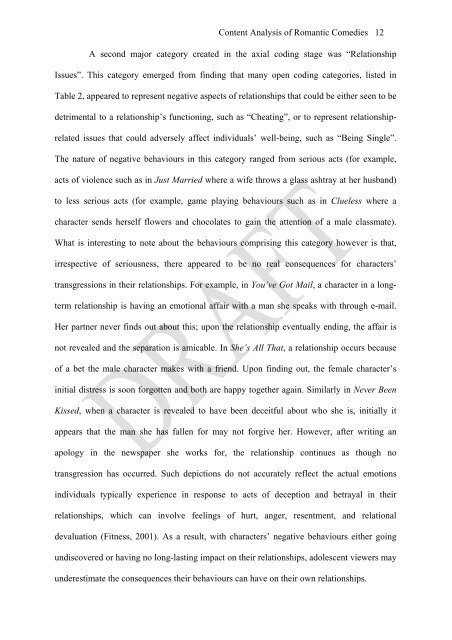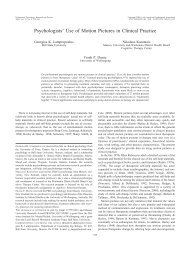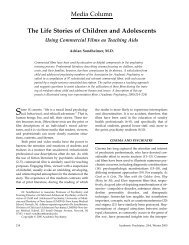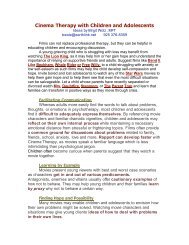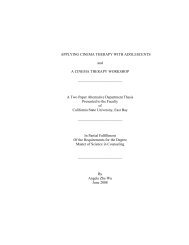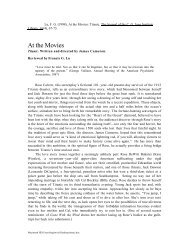Content Analysis of Romantic Comedies IN PRESS ...
Content Analysis of Romantic Comedies IN PRESS ...
Content Analysis of Romantic Comedies IN PRESS ...
Create successful ePaper yourself
Turn your PDF publications into a flip-book with our unique Google optimized e-Paper software.
<strong>Content</strong> <strong>Analysis</strong> <strong>of</strong> <strong>Romantic</strong> <strong>Comedies</strong> 12A second major category created in the axial coding stage was “RelationshipIssues”. This category emerged from finding that many open coding categories, listed inTable 2, appeared to represent negative aspects <strong>of</strong> relationships that could be either seen to bedetrimental to a relationship’s functioning, such as “Cheating”, or to represent relationshiprelatedissues that could adversely affect individuals’ well-being, such as “Being Single”.The nature <strong>of</strong> negative behaviours in this category ranged from serious acts (for example,acts <strong>of</strong> violence such as in Just Married where a wife throws a glass ashtray at her husband)to less serious acts (for example, game playing behaviours such as in Clueless where acharacter sends herself flowers and chocolates to gain the attention <strong>of</strong> a male classmate).What is interesting to note about the behaviours comprising this category however is that,irrespective <strong>of</strong> seriousness, there appeared to be no real consequences for characters’transgressions in their relationships. For example, in You’ve Got Mail, a character in a longtermrelationship is having an emotional affair with a man she speaks with through e-mail.Her partner never finds out about this; upon the relationship eventually ending, the affair isnot revealed and the separation is amicable. In She’s All That, a relationship occurs because<strong>of</strong> a bet the male character makes with a friend. Upon finding out, the female character’sinitial distress is soon forgotten and both are happy together again. Similarly in Never BeenKissed, when a character is revealed to have been deceitful about who she is, initially itappears that the man she has fallen for may not forgive her. However, after writing anapology in the newspaper she works for, the relationship continues as though notransgression has occurred. Such depictions do not accurately reflect the actual emotionsindividuals typically experience in response to acts <strong>of</strong> deception and betrayal in theirrelationships, which can involve feelings <strong>of</strong> hurt, anger, resentment, and relationaldevaluation (Fitness, 2001). As a result, with characters’ negative behaviours either goingundiscovered or having no long-lasting impact on their relationships, adolescent viewers mayunderestimate the consequences their behaviours can have on their own relationships.


